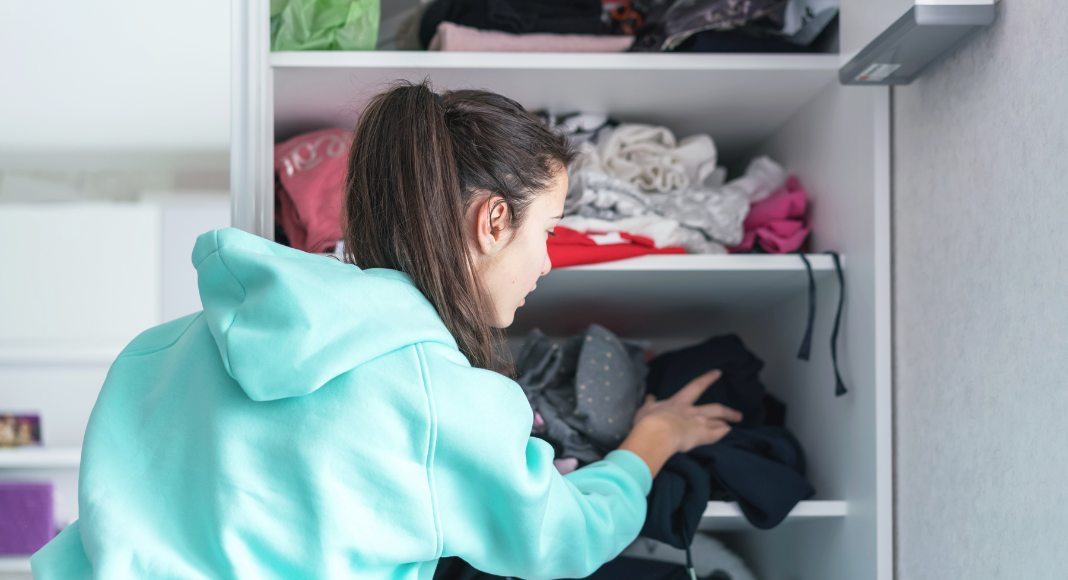Do you cringe a bit when you peek inside your child’s closet or bedroom and see things out of place? If you’re part of the generation that grew up with this idea that a clean room was the highest honor, then yes, it probably drives you a little crazy to see a bit of a mess. And, you might have even thought that you need to lecture your kids about showing more respect for their things. But, does it have to be this way? Can we help our kids show respect for their things without it being a giant argument?
 Albiona from The Parenting Post is here with some advice on just this idea: that our children can show respect for what they have–in their own way–and we don’t need to lose our cool when it seems like they’re not. Sometimes, it’s actually a little bit more about us . . . and less about them.
Albiona from The Parenting Post is here with some advice on just this idea: that our children can show respect for what they have–in their own way–and we don’t need to lose our cool when it seems like they’re not. Sometimes, it’s actually a little bit more about us . . . and less about them.
How do we help our kids show respect for their things–and what should we do when they don’t?
First, we should always start with ourselves. We can carry a lot of rigidity around what our expectations are in terms of what kids should and shouldn’t do and how they should care for their things.
Let’s say you grew up in a home where was a lot of emphasis on the way your room needed to look–neat, orderly, clean. There were a lot of rules and expectations around it. And you so you kept it neat, orderly, and clean. You did it whether you understood why, or because you were afraid to not do it. There are a lot of reasons why we follow those types of rules. I’m not saying that they’re bad; you just want to really consider your own upbringing when it comes to this.
Now fast forward to today. It’s a different generation of kids, and we’re a different generation of parents. We want our children to take care of something that we know is valuable or important. And when they don’t, we immediately get triggered. Because for us, that was such an important part of the way we grew up and it was so emphasized to us that if you didn’t take good care of your things, it meant you were bad, disorganized, or irresponsible. There were a lot of names attached to people who didn’t take care of their things. So we see that and we get immediately triggered.
Our response to our child tends to be at a ten rather than at a two. But here’s the thing: our child doesn’t see things the way we see them, from how we grew up. They haven’t lived enough of an experience to really understand what it means to appreciate their things. We certainly want to teach them; we want to guide them and help them to get to that point where they are truly appreciating what they have. But we can’t go at it right away at a ten. We can’t come at them so triggered about it.
So look at your rigidity around what you’re holding on to about this particular topic.
How is it showing up in the way you’re trying to connect with your child when you’re looking to shape or change their behavior? Once you see your trigger, you will almost always respond to them in a much healthier way. Now instead of being at a ten, maybe you bring it down to a two and you just bring them over and say something like this:
“You know what? Let’s connect on this for a second. Here’s what I’m seeing and here’s what it feels like to me. I worked really hard. I wanted to make sure that you had ______. I know this means a lot to you, and maybe you don’t see it this way. But part of our job when we have the opportunity to have something is to really care for it and take care of it. So tell me some things you can do to show me that you can take care of ______. Because I want to really make sure, and I know you can do it. I know you’re responsible enough to take care of your things.”
Put it back on them to tell you how they plan to take care of their things.
Instead of just giving a directive and getting annoyed and being really frustrated and then attaching names that aren’t even true (ungrateful, unappreciative, etc.), work together on this but let them take the lead. The truth is, we want to really dial it down. We want to look at what’s coming up for ourselves. We want to make sure we’re responding from a neutral place.
And connect–you always want to connect. As Dr. Siggie says, “Then, we look to correct.” Then, come up with the plan. But give them the autonomy and the agency to be able to come up with a way to show you that they can take care of their things, that your kids can show respect for their things, while you’re really empowering them with your words and saying, “Hey, I know you got this, and I know you can do this. I really think there’s a way we can come together.”










